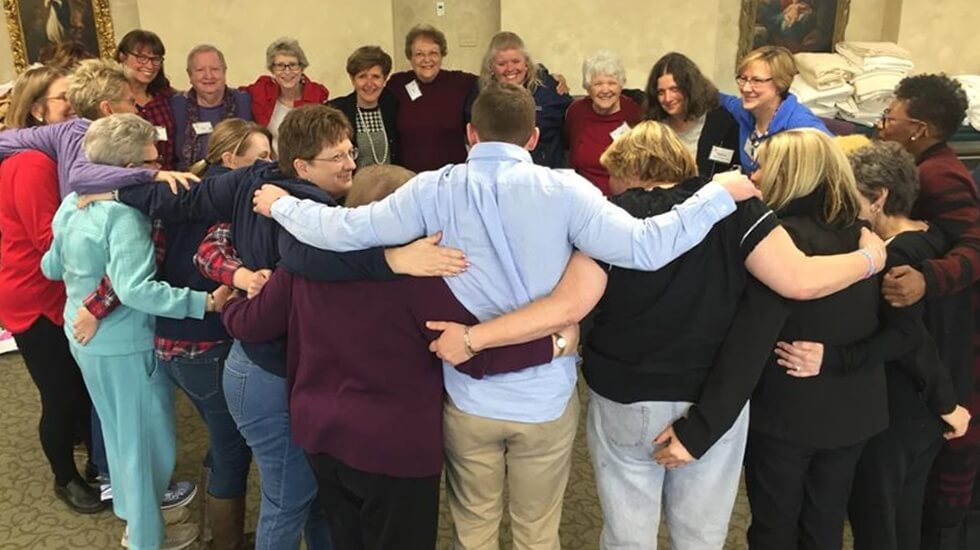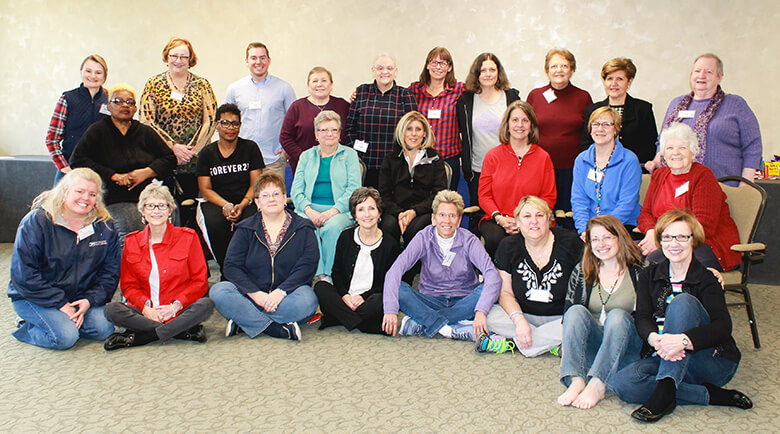


Editor’s Note: Over the past several weeks, we have shared how NBCF recently partnered with Johns Hopkins to provide a retreat for metastatic breast cancer patients (and their female caregivers). NBCF staffer, Rebecca, has written a four-part blog series on what she learned from spending the weekend with these patients. She wrote about redefining what it means to be present and finding hope again after losing it . If you’re just tuning in, we encourage you to revisit these posts. This week, in the final post, she discusses how access to information plays a critical role in restoring hope.
We’ve already explored some of the relational and inspirational implications of a metastatic breast cancer diagnosis, but we can’t forget the medical side of the equation. I am not a doctor, but the diagnostic and treatment-related insights provided at the metastatic breast cancer retreat by Dr. John Fetting (breast medical oncologist) and Lillie Shockney (RN, Director of the Johns Hopkins Breast Center, and a pioneer in Patient Navigation) were both fascinating and encouraging. The retreat taught me that even though we may never have all the answers, information helps restore hope.
One of the most beneficial retreat sessions was when Dr. Fetting sat with the women for 90 minutes and asked each one about her specific diagnosis, including probing into her past and current treatment protocols. He has worked in the breast oncology field for 30+ years, yet he was as engaged in listening as the young medical student who was there, as an observer, to learn. You could see the relief wash over many of the patients’ faces as Dr. Fetting validated their courses of treatment and/or encouraged them to inquire about other potential therapies. They’d been granted a no-cost second opinion. And in a world of cynicism about the big business of healthcare, here sat a man who gave up part of his Saturday night to help women, not because he will bill their insurance, but because he wanted to give them hope. While most of those conversations were personal and case-specific, there were a number of fascinating general insights from the retreat which can help many of us learn more about the science of metastatic breast cancer.
Here are the top 4 insights, presented in Q&A format:
Question 1: Why/how did my breast cancer spread to other parts of my body if it was detected early and I had a mastectomy?
A: “Before the cancer was detected in the breast, it had already moved to somewhere else, most commonly the bones. It sat there dormant for many years until something woke it up. If we can prevent the cancer from leaving the breast, no one would ever die.”—Lillie
Question 2: Why did mammograms miss my breast cancer so that it wasn’t detected until it had already left my breast(s)?
A: “Mammograms do have some limitations. When they work, they work great, but they don’t always work. Mammography is still the best tool we have, but it relies on a cancer to grow large enough to be seen by a human. Hopefully in the future, we’ll be able to do a better job of identifying whom is at greatest risk earlier and providing more individualized screening recommendations.”—Dr. Fetting
Question 3: How does my ER+/-, PR+/- and HER2+/- receptor status* impact my prognosis as a metastatic patient?
A: “ER/PR+, HER2- metastatic patients currently have the longest lifespan. Interestingly, one in five patients’ tumor type will switch from ER- to ER+ when it metastasizes. For this reason, it’s often recommended that the pathologist assess the tumor type of the second tumor to ensure the hormonal treatment therapies prescribed by the doctor are in sync with the nature of the tumor being treated, not just the original breast cancer.”—Lillie
Question 4: What is palliative care and why do I need it?
A: “Every cancer patient should have a palliative care doctor as part of her cancer care team. There is a common misconception that these doctors exist for the purpose of putting patients to sleep in their final days to escape their intractable pain, but their true purpose is quality of life preservation and quality of life restoration. They do their best to help you continue the things you love, and that bring you joy, for as long as possible.”—Lillie
This retreat truly changed me. I still fervently pray that no one experience metastatic breast cancer…but, now I also pray that I would always be present, find reasons to hope, and arm myself with the power of information, whether in good health or in poor health. To the entire team of retreat organizers and volunteers, thank you for helping us serve these special women. To the caregivers, please continue to find moments to take care of yourself amidst your relentless commitment to show love to the patient in your life. And finally, to these nine patients—Anne, Debbie E., Debbie H., Diane, Kay, Linda, Machelle, Maggie, and Susanna—I am pulling for you. I pray that you find joy, peace, and new reasons to hope in each day you are given.
This retreat was just one small part of providing support to women with all stages of breast cancer—learn how you can join us in Helping Women Now.

*ER+/- is an indication of whether the tumor grows in response to estrogen.
PR+/- is an indication of whether the tumor grows in response to progesterone.
HER2+/- is an indication of whether the tumor cell proteins grow normally or excessively.
These tumor attributes all affect the type of treatment prescribed and may also affect the expected outcomes.
Donations are always appreciated, but there are lots of great ways to get involved.
We use cookies on our website to personalize your experience and improve our efforts. By continuing, you agree to the terms of our Privacy & Cookies Policies.
I am 49 and married with two teenagers. Recently diagnosed with ER/PR+, HER2- invasive, lobular, carcinoma, right breast, and at least one lymph node. I’ve seen two different breast surgeons with two very different treatment plans.
Surgeon one seems a lot more conservative and maybe more cutting edge. Recommends surgery with immediate reconstruction if I want it. Single mastectomy or double, my choice. Recommends only taking a few lymph nodes and thinks the surgery can be a nipple sparing. I meet with the plastic surgeon next week. He thinks that depending on the findings of the surgery I might avoid chemo and only need radiation. Did not seem concerned about doing radiation with an expander, but I will discuss with the plastic surgeon as well.
Surgeon number two seems a bit more aggressive in his treatment plan. Also recommends single (or double) mastectomy most likely followed by chemo and then radiation. Strongly recommends delaying reconstruction until after the radiation. No nipple sparing and plans on a large horizontal incision right across my breast.
No disrespect to those who decide to go flat, and while I definitely do not want one surgery, let alone several, I cannot imagine having one breast and nothing on the other side, or simply two large scars on my chest for the rest of my life. My breasts aren’t even that large to begin with! I just want to still look good naked, and in bathing suits, and other clothing.
Your kind thoughts and experiences are appreciated.